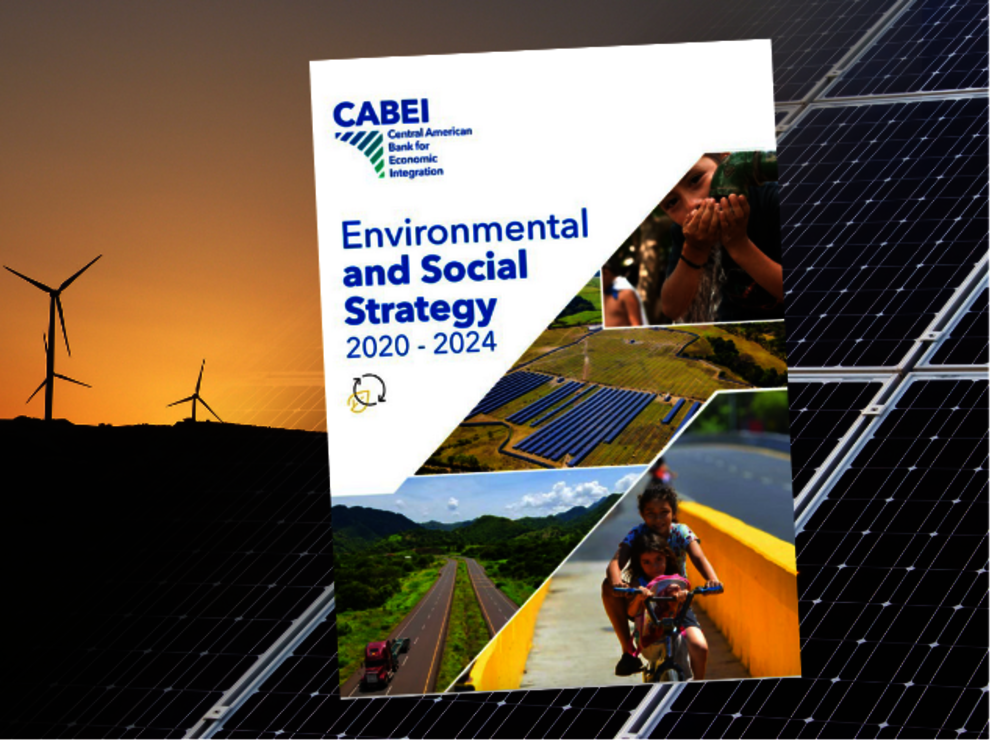CABEI reaffirms commitment to sustainable development with equity and inclusion

In line with its Environmental and Social Strategy, CABEI reinforces its commitment to a sustainable planet on World Environment Day.
Tegucigalpa, June 5ht, 2022. – The Central American Bank for Economic Integration (CABEI) commemorates this date by presenting its five-year Environmental and Social Strategy (EAS) which is the result of a broad participatory process and consultation with different sectors that strengthens the execution of its initiatives towards sustainable development, within the framework of its 2020-2024 Institutional Strategy and the Sustainable Development Goals (SDGs).
"Our 2020-2024 Environmental and Social Strategy is an example of the efforts we have been promoting and that make us the green bank in the region. Today, as we commemorate World Environment Day, the Bank reinforces its compliance with the principles of international best practices, financing for sustainable development, transparency, consultation, and citizen participation in our countries," said Dr. Dante Mossi, CABEI President.
The purpose of the 2020-2024 EAS, Dr. Mossi explained, is to fulfill two major commitments assumed by the Bank; the first is to provide support so that member and beneficiary countries can implement programs and projects that meet the condition of being environmentally and socially sustainable. The second is based on the fulfillment of the commitment to strengthen capacities to evaluate, measure and manage the risks and impacts that may arise from these initiatives.
In this sense, institutional management includes actions to prevent and avoid risks, as well as to mitigate, reverse and compensate for any impact, promoting community participation and the Complaints and Grievance Mechanism (MQR for its acronym in Spanish), among others.
Strategic vision that contributes to the Development Agenda
"The socialization process to arrive at the strategy lasted more than a year, during which many actions were carried out to inform, listen to and attend to recommendations from the actors with whom CABEI works on a daily basis, strategic partners and organizations to which CABEI belongs," explained Julio Cárcamo, head of the Monitoring Office.
The 2020-2024 EAS operationalizes CABEI's vision of being a benchmark for sustainable development and economic integration in the region, effectively impacting the well-being of society.
In this regard, Cárcamo indicated that, in line with CABEI's Institutional Strategy, the EAS incorporates gender and equity as a new cross-cutting theme, as well as the evolution of the environmental and social approach to face the challenges of being one of the most vulnerable regions to climate change, but also with many opportunities for sustainable development.
To address these challenges, the EAS proposes global, regional, and local development agendas, helping each country to achieve its SDG targets and Nationally Determined Contributions (NDCs), accredited before the United Nations Framework Convention on Climate Change (UNFCCC).
One of the advantages of CABEI's EAS is that it allows for more agile responses to assist countries under the cross-cutting rationale of community climate resilience, mitigation, and adaptation to phenomena such as the COVID-19 pandemic, the effects of which are addressed within the document.
The other three cross-cutting elements of the strategy are social inclusion, gender equity and equality, and environmental and social risk management of operations. The latter is based on the principle of measuring positive impact in relation to development and environmental sustainability indicators.
Another important advantage of the EAS is that it allows the permanent measurement and evaluation of the expected impacts, especially in each of the ten key sectors promoted through it to strengthen environmental and social sustainability in full compliance with the 2022-2024 Institutional Strategy.
The road traveled by the Green Bank of Central America
CABEI has achieved important experience as one of the 23 institutions that make up the International Development Finance Club (IDFC), with the commitment to contribute to the agendas of the Paris Climate Agreement and the United Nations (UN) Sustainable Development Goals.



